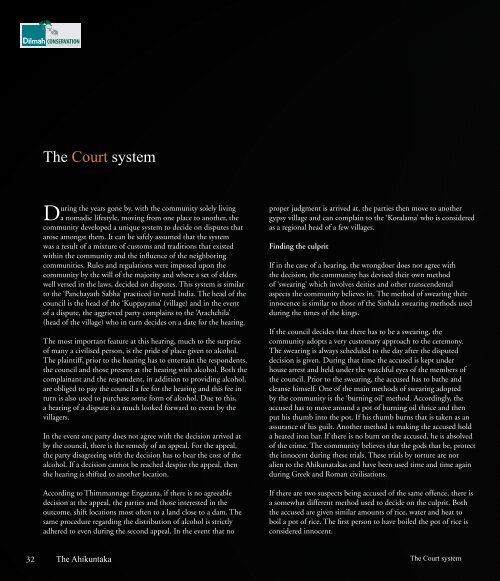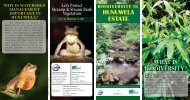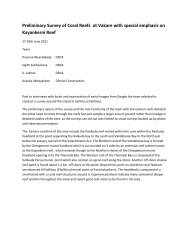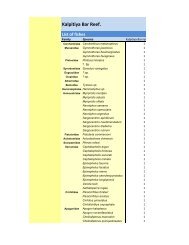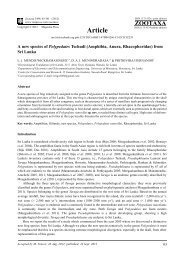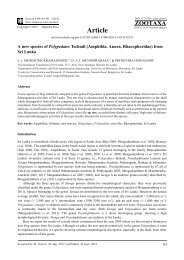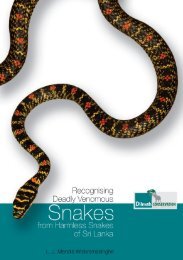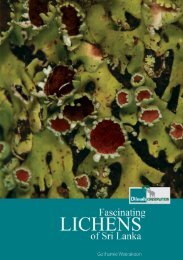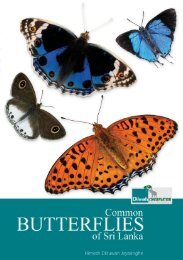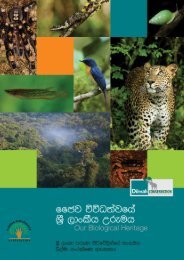The Ahikuntaka
A publication documenting the lives and livelihoods of the Ahikuntaka or gypsy community in Sri Lanka. A collection of vibrant photographs and a baseline survey on the current socio economic status of the Ahikuntaka conducted by the Colombo University complement this timely publication.
A publication documenting the lives and livelihoods of the Ahikuntaka or gypsy community in Sri Lanka. A collection of vibrant photographs and a baseline survey on the current socio economic status of the Ahikuntaka conducted by the Colombo University complement this timely publication.
Create successful ePaper yourself
Turn your PDF publications into a flip-book with our unique Google optimized e-Paper software.
www.dilmahconservation.org<br />
<strong>The</strong> Court system<br />
During the years gone by, with the community solely living<br />
a nomadic lifestyle, moving from one place to another, the<br />
community developed a unique system to decide on disputes that<br />
arose amongst them. It can be safely assumed that the system<br />
was a result of a mixture of customs and traditions that existed<br />
within the community and the influence of the neighboring<br />
communities. Rules and regulations were imposed upon the<br />
community by the will of the majority and where a set of elders<br />
well versed in the laws, decided on disputes. This system is similar<br />
to the ‘Panchayath Sabha’ practiced in rural India. <strong>The</strong> head of the<br />
council is the head of the ‘Kuppayama’ (village) and in the event<br />
of a dispute, the aggrieved party complains to the ‘Arachchila’<br />
(head of the village) who in turn decides on a date for the hearing.<br />
<strong>The</strong> most important feature at this hearing, much to the surprise<br />
of many a civilised person, is the pride of place given to alcohol.<br />
<strong>The</strong> plaintiff, prior to the hearing has to entertain the respondents,<br />
the council and those present at the hearing with alcohol. Both the<br />
complainant and the respondent, in addition to providing alcohol,<br />
are obliged to pay the council a fee for the hearing and this fee in<br />
turn is also used to purchase some form of alcohol. Due to this,<br />
a hearing of a dispute is a much looked forward to event by the<br />
villagers.<br />
In the event one party does not agree with the decision arrived at<br />
by the council, there is the remedy of an appeal. For the appeal,<br />
the party disagreeing with the decision has to bear the cost of the<br />
alcohol. If a decision cannot be reached despite the appeal, then<br />
the hearing is shifted to another location.<br />
According to Thimmannage Engatana, if there is no agreeable<br />
decision at the appeal, the parties and those interested in the<br />
outcome, shift locations most often to a land close to a dam. <strong>The</strong><br />
same procedure regarding the distribution of alcohol is strictly<br />
adhered to even during the second appeal. In the event that no<br />
proper judgment is arrived at, the parties then move to another<br />
gypsy village and can complain to the ‘Koralama’ who is considered<br />
as a regional head of a few villages.<br />
Finding the culprit<br />
If in the case of a hearing, the wrongdoer does not agree with<br />
the decision, the community has devised their own method<br />
of ‘swearing’ which involves deities and other transcendental<br />
aspects the community believes in. <strong>The</strong> method of swearing their<br />
innocence is similar to those of the Sinhala swearing methods used<br />
during the times of the kings.<br />
If the council decides that there has to be a swearing, the<br />
community adopts a very customary approach to the ceremony.<br />
<strong>The</strong> swearing is always scheduled to the day after the disputed<br />
decision is given. During that time the accused is kept under<br />
house arrest and held under the watchful eyes of the members of<br />
the council. Prior to the swearing, the accused has to bathe and<br />
cleanse himself. One of the main methods of swearing adopted<br />
by the community is the ‘burning oil’ method. Accordingly, the<br />
accused has to move around a pot of burning oil thrice and then<br />
put his thumb into the pot. If his thumb burns that is taken as an<br />
assurance of his guilt. Another method is making the accused hold<br />
a heated iron bar. If there is no burn on the accused, he is absolved<br />
of the crime. <strong>The</strong> community believes that the gods that be, protect<br />
the innocent during these trials. <strong>The</strong>se trials by torture are not<br />
alien to the Ahikunatakas and have been used time and time again<br />
during Greek and Roman civilisations.<br />
If there are two suspects being accused of the same offence, there is<br />
a somewhat different method used to decide on the culprit. Both<br />
the accused are given similar amounts of rice, water and heat to<br />
boil a pot of rice. <strong>The</strong> first person to have boiled the pot of rice is<br />
considered innocent.<br />
32 <strong>The</strong> <strong>Ahikuntaka</strong><br />
<strong>The</strong> Court system


